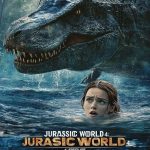2012 (2009)

“2012,” directed by Roland Emmerich and released in 2009, is a visually stunning disaster film that captures the audience’s attention with its grand scale and high-stakes narrative. Produced by Harald Kloser, Mark Gordon, and Larry J. Franco, and co-written by Kloser and Emmerich, the film presents a catastrophic vision of the world facing apocalyptic events, exploring themes of survival, sacrifice, and the enduring human spirit in the face of overwhelming odds.
The film begins with a series of dramatic events triggered by catastrophic climate change, leading to the destabilization of the Earth’s crust. As natural disasters unfold—massive earthquakes, tsunamis, and volcanic eruptions—the film introduces viewers to a diverse cast of characters who are brought together by their desperate fight for survival. The narrative follows Jackson Curtis, played by John Cusack, a struggling writer and a devoted father, as he navigates the chaos and seeks to protect his family amidst the unfolding disaster.
One of the film’s notable strengths lies in its ability to create a sense of urgency and suspense. Emmerich is known for his mastery of disaster filmmaking, and “2012” is no exception. The pacing is relentless, with scenes of destruction that are both awe-inspiring and terrifying. From the initial earthquake in Los Angeles to the spectacular destruction of landmarks around the world, the visual effects are breathtaking. The sheer scale of the disasters serves to highlight the fragility of human existence, emphasizing the unpredictability of nature and the consequences of our actions.
The characters in “2012” are diverse, each representing different facets of society. Alongside Jackson, we meet his estranged wife, Kate (Amanda Peet), and their children, as well as various supporting characters, including a wealthy industrialist, played by Oliver Platt, and a scientist, portrayed by Chiwetel Ejiofor. These characters add depth to the narrative, illustrating the varied responses to crisis—ranging from selfishness and greed to selflessness and bravery. Their interactions serve to underscore the film’s central themes of family, loyalty, and the human capacity for sacrifice.

One of the film’s most poignant moments occurs when Jackson, driven by his love for his family, must make difficult choices that test his character. As the world crumbles around them, he demonstrates a fierce determination to protect his loved ones, embodying the film’s message about the importance of human connections in times of crisis. The emotional stakes are heightened as the characters face life-and-death situations, creating a powerful narrative tension that keeps viewers invested in their fates.

“2012” also explores the notion of governmental and societal responses to disaster. The film depicts a secretive plan by world leaders to save a select few by constructing massive arks capable of withstanding the cataclysmic events. This aspect of the story raises ethical questions about privilege, survival, and the moral implications of deciding who is worthy of salvation. The juxtaposition of individual struggles against the backdrop of global catastrophe serves to highlight the complexities of human nature and societal structures.

Emmerich’s direction is complemented by impressive visual effects that bring the disaster scenarios to life. The film’s cinematography captures the scale of destruction with meticulous attention to detail. The iconic scenes, such as the flooding of the city of Los Angeles and the collapse of the Himalayas, are visually stunning and serve as a reminder of nature’s raw power. These sequences are not just spectacles; they serve to enhance the narrative by illustrating the chaos and unpredictability of the world as it descends into turmoil.
The score, composed by Harald Kloser and Thomas Wanker, further amplifies the film’s emotional impact. The music underscores the urgency of the situation and enhances key moments, drawing viewers into the emotional experiences of the characters. The combination of visuals and sound creates an immersive experience, heightening the tension and drama of the unfolding events.

In conclusion, “2012” is a captivating disaster film that combines stunning visual effects, a gripping narrative, and deep thematic exploration. Roland Emmerich’s direction and the performances of the cast create a compelling story of survival and resilience in the face of catastrophe. While the film showcases the destructive power of nature, it also celebrates the strength of the human spirit and the bonds that connect us in times of crisis. “2012” stands as a reminder of our vulnerability in the face of natural forces, urging audiences to reflect on the importance of unity and compassion as we navigate the challenges of life. With its blend of spectacle and emotional depth, “2012” remains a significant entry in the disaster film genre, leaving viewers both entertained and contemplative about the fragility of existence.
Suggested videos for you:
Blitz (2011)
Suggested videos for you:
Super intelligent zombies with sex hormones || Day Of The Dead Bloodline
Suggested videos for you:











